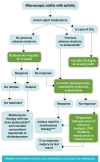Microscopic colitis: Etiopathology, diagnosis, and rational management
- PMID: 35913459
- PMCID: PMC9342949
- DOI: 10.7554/eLife.79397
Microscopic colitis: Etiopathology, diagnosis, and rational management
Abstract
Microscopic colitis is an inflammatory bowel disease divided into two subtypes: collagenous colitis and lymphocytic colitis. With an increasing incidence of microscopic colitis exceeding those of ulcerative and Crohn's disease among elderly people in some countries, microscopic colitis is a debilitating life experience. Therefore, physicians should be familiar with its clinical features and management strategies because the disease deserves the same attention as the classical inflammatory bowel diseases. Here, state-of-the-art knowledge of microscopic colitis is provided from a global perspective with reference to etiopathology and how to establish the diagnosis with the overall aim to create awareness and improve rational management in clinical practice. The immune system and a dysregulated immune response seem to play a key role combined with risk factors (e.g. cigarette smoking) in genetically predisposed individuals. The symptoms are characterized by recurrent or chronic nonbloody, watery diarrhea, urgency, weight loss, and a female preponderance. As biomarkers are absent, the diagnosis relies on colonoscopy with a histological assessment of biopsy specimens from all parts of the colon. Although the disease is not associated with a risk of colorectal cancer, a recent nationwide, population-based cohort study found an increased risk of lymphoma and lung cancer. Budesonide is the first-line therapy for management, whereas immunomodulatory drugs (including biologics) and drugs with antidiarrheal properties may be indicated in those failing, dependent, or intolerant to budesonide. In microscopic colitis induced by checkpoint inhibitors, a drug class used increasingly for a wide range of malignancies, a more aggressive therapeutic approach with biologics introduced early seems reasonable. However, particular attention needs to be drawn to the existence of incomplete forms of microscopic colitis with the risk of being overlooked in routine clinical settings.
Keywords: Microscopic colitis; collagenous colitis; etiopathology; lymphocytic colitis; medicine; prognosis; therapy.
© 2022, Nielsen et al.
Conflict of interest statement
ON, TS No competing interests declared, FF Research grant from Falk Pharma; Consulting fee from Tillotts and Biomedal; Lectures for General Electrics and Termo Fisher, and travel support from Tillotts, Ferring, and Janssen as listed in the ICMJE form, DP Grants from Atlantic, Finch, Salix, Janssen, Pfizer, Seres, Applied Molecular Transport, and Takeda; Consulting fees from Abbvie, Vedanta, Seres, Immunic, Merck, Otsuka, Ferring, Rise Therapeutics, Boehringer Ingelheim, and Summit Therapeutics as listed in the ICMJE form
Figures




References
-
- Abu-Sbeih H, Ali FS, Alsaadi D, Jennings J, Luo W, Gong Z, Richards DM, Charabaty A, Wang Y. Outcomes of vedolizumab therapy in patients with immune checkpoint inhibitor-induced colitis: a multi-center study. Journal for Immunotherapy of Cancer. 2018;6:142. doi: 10.1186/s40425-018-0461-4. - DOI - PMC - PubMed
-
- Abughazaleh S, Glassner K, Wilhite A, Abraham B. A stellar case of stelara in the treatment of lymphocytic colitis. American Journal of Gastroenterology. 2019;114:S1154. doi: 10.14309/01.ajg.0000597784.76385.ea. - DOI
-
- Bakke I, Walaas GA, Bruland T, Røyset ES, van Beelen Granlund A, Escudero-Hernández C, Thorsvik S, Münch A, Sandvik AK, Østvik AE. Mucosal and faecal neutrophil gelatinase-associated lipocalin as potential biomarkers for collagenous colitis. Journal of Gastroenterology. 2021;56:914–927. doi: 10.1007/s00535-021-01814-y. - DOI - PMC - PubMed
MeSH terms
Substances
LinkOut - more resources
Full Text Sources
Research Materials

